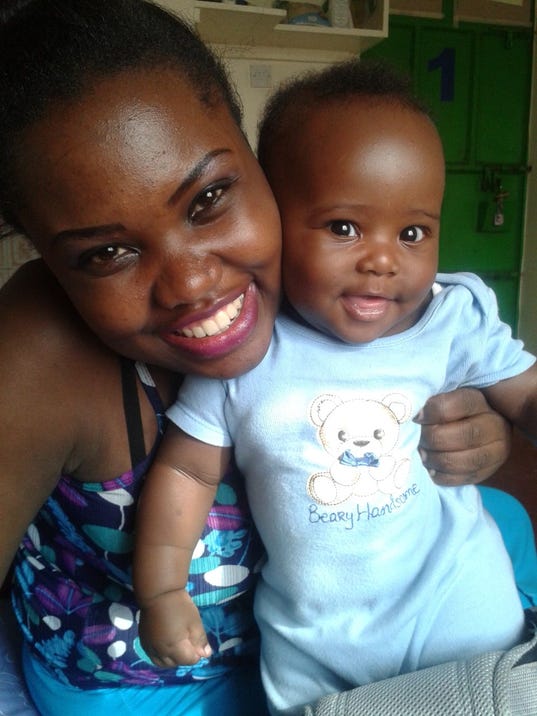
Dorcas Amunga with her son Wilson Namayi who was kidnapped from her home in Nairobi's Kayole slum, and reportedly trafficked.(Photo: Tonny Onyulo)
NAIROBI, Kenya — In this country of widespread poverty, one of the most lucrative businesses is also one of the most heartbreaking: baby trafficking.
It is common in Kayole, a slum in the capital here, for gangs to steal or buy infants from mothers who are told their child had died or who can't afford to have more children.
Fueling the trade are couples seeking to adopt children, kidnappers extracting ransoms from families desperate to reclaim their little ones and the economic value of children forced into labor.
Children in Kenya can fetch between $2,000 and $3,000, depending on their gender, race and tribe — far more than the $1,246 annual income the average Kenyan earns.
"I witnessed a case where a woman wanted to sell her twins," said Julia Kattam, a health clinic administrator in Kayole. "She could not afford to feed them."
Lucy Wamboi, a Kayole resident who has helped friends try to find their missing children, said health workers sometimes participate in the trade. "The cost for a baby boy may be higher because they are in demand here," Wamboi said. "We've seen (doctors) selling babies to mothers."
Kenya hosts one of the biggest child trafficking markets in West Africa, said Prudence Mutiso, an attorney with the Cradle Children Foundation, which provides legal representation for children in Kenyan courts.
The rush of poor Kenyans from the countryside into its sprawling cities is increasing the market, while traffickers commonly ferry young girls ages 10 to 14 from rural areas to Nairobi for prostitution and forced marriage, Mutiso said.
"Poverty and lack of knowledge on trafficking are some of the factors contributing to trafficking," Mutiso said.
The prosecution rate of offenders is low, she added. Prosecutors brought only 43 child-trafficking cases to court out of 200 cases reported to the foundation, according to a recent Cradle Children report. Only a handful resulted in convictions.
Dorcas Amunga, 21, believes traffickers abducted her 8-month-old son, Wilson. She left him at home with her two nieces a few months ago. While she was out, a young woman they didn't know knocked and said Amunga had asked her to bring the baby to his mother.
"I willingly gave her the baby and the woman left," said Emily Musosi, Amunga's 10-year-old niece. "I thought she had been sent by Dorcas, because she knew all of us in the house by name."
Another trafficking scheme involves couples who place requests to adopt babies at Kayole clinics before they are born. Doctors who traffic in infants tell new mothers their babies didn't survive, and then fill the orders.
"I was told that my baby had died during delivery, but when I demanded to be shown the remains of her body, the health officials chased me away," said Esther Maina, 34, a mother with two daughters, who reported the incident to police.
Police arrested the doctors and closed the clinic where she gave birth. Authorities are still trying to learn the fate of her child.
"We recovered a (missing) 2-week-old baby in the care of the hospital staff, following the police raid," said regional police Chief Stephen Ngetich. "We urge parents who may have lost their infants to come forward."
In December after Maina went to police, officials arrested Joseph Kangari, a local doctor who owns the clinic, and charged him and other staff with kidnapping and trafficking. Police said he was offering maternity services illegally and selling infants to infertile women.
Kangari along with other suspects arrested at the clinic denied the charges, insisting the baby's mother wanted to give up the child for adoption.
Joan Akinyi, founder of What Would Jesus Do Ministries, an outreach group for at-risk Kenyan youth, said its family programs are making a dent in the baby trade.
"We've been going around every slum to educate teenagers against early pregnancies and abstinence from early sex," Akinyi said. "These are the practices which lead to baby trafficking, because most teenagers cannot take care of young ones," so they sell the babies.
All that doesn't matter to Amunga, who continues her heartbreaking search for baby Wilson at local hospitals and orphanages.
"It's painful and unbelievable as a mother to lose your baby," she said. "I wish the person who took my baby would understand this and return him."
Read or Share this story: http://usat.ly/1BMjQ7E